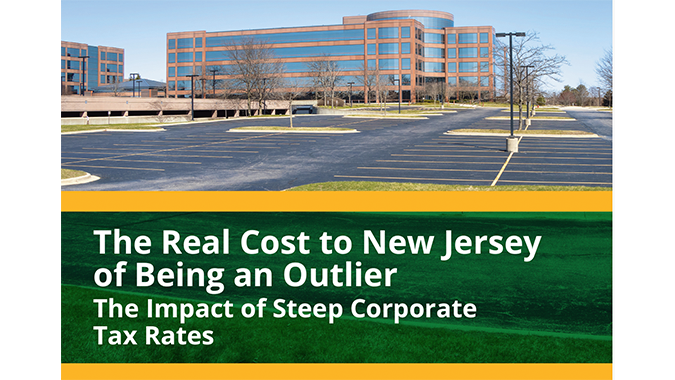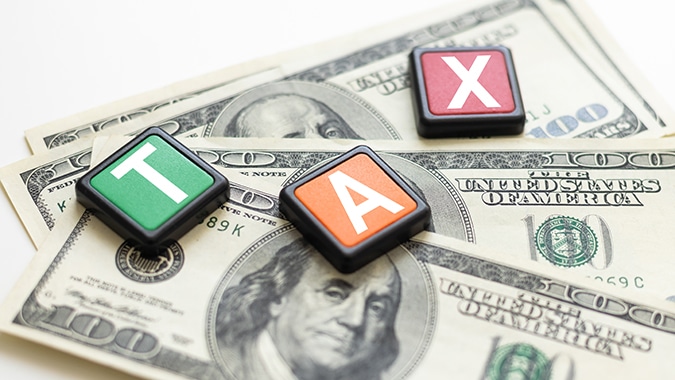A new report concludes New Jersey’s tax climate is uncompetitive and recommends ratcheting down New Jersey’s highest-in-the-nation 11.5% corporate business tax over the next two to five years to be more in line with the national average of 5% to 6%.
The nonprofit Garden State Initiative said the CBT reduces New Jersey’s gross domestic product (GDP) by nearly $8 billion a year and made a series of recommendations in its report, The Real Cost to New Jersey of Being an Outlier: The Impact of Steep Corporate Tax Rates, including:
- The temporary 2.5% corporate tax “surcharge” New Jersey adopted in 2018 and extended to 2023 must be immediately eliminated without further delay.
- The New Jersey CBT tax should be ratcheted down even further over a two-to-five-year phase period to the national average rate of 5 to 6%.
- To pay for reductions in the CBT tax rate, the state should repeal most of the $1.2 billion in revenue lost by special interest or questionable write-offs and special interest exemptions. These loopholes reduce collections from the CBT by 20% to pass favor to certain companies rather than making a stronger and fairer tax structure.
- For maximum economic benefit, New Jersey should consider eliminating the CBT altogether over the long term. Eliminating the tax altogether would raise the rate of growth in personal income by roughly 30%.
- New Jersey should simultaneously eliminate future tax incentive programs. While certain companies will protest the elimination of existing incentives, everyone will benefit from the elimination of the CBT, creating a level playing field for all companies and a more vibrant economy moving forward.
The report notes no state in the country imposes a more punitive tax on its home-based corporations than does New Jersey. The New Jersey 11.5% tax rate is roughly twice as high as the 50-state average and only contributes 4% to 7% of total revenues to the state depending on the year. Coupled with the United States’ statutory federal tax rate on American corporations (21%), New Jersey’s combined federal-state rate is 31% – making our state among the most expensive places in the world to do business.
Excessive corporate taxation inhibits overall growth, and the report notes the following telling statistics:
- The number of Fortune 500 companies headquartered in New Jersey fell from 22 in 2006 to 15 in 2021.
- The state has lost between $350 and $400 billion in personal income since 1990 due to outward migration. The state’s total personal income would be about 30% larger today if not for people and businesses leaving.
- Between 2005 and 2020 New Jersey has lost population and income to all but two of the other 49 states.
- The state’s population has fallen every year relative to the rest of the nation in every year for the last three decades.
“Companies consider many quantitative and qualitative factors when making their site-selection decisions. Important among these, especially in high-cost states in the Northeast like New Jersey, is the corporate income tax rate – now the highest in the nation at 11.5%,” said John Boyd, Jr., Principal of The Boyd Company, Inc., a Princeton-based corporate site selection consultancy.
“An elimination of the 2.5% CBT surcharge is good first step but falls far short of the kind of tax and regulatory re-engineering that needs to take place in New Jersey for its business climate to be more competitive,” Boyd said. “I would suggest that Governor Murphy follow the lead of North Carolina’s Democratic Governor Roy Cooper who has signed off on legislation reducing his state’s 2.5% corporate income tax – currently the lowest in the nation – down to 0% by the end of the decade. New Jersey can go to school here as North Carolina is one of the most popular landing spots for companies and people leaving the high taxes of New Jersey.”
“With our state’s natural attributes, including a highly skilled and trained union workforce, New Jersey has a historic opportunity to reinvigorate our economy in a way unseen in over a generation,” said IBEW Local 102 Business Manager Patrick Delle Cava. “Through common sense tax reform that will even the playing field with other states in our region and across the country, our strengths will again make New Jersey a magnet for investment and residents. Such reform will have widespread benefits for our state and especially for Middle Class working families. The Garden State Initiative’s thoroughly sourced report and analysis should serve as the launching point for a true effort to restore New Jersey’s competitive standing.”
“NJBIA has been a vocal proponent for business tax relief,” said Michele Siekerka, NJBIA president & CEO. “We must ensure that the sunset of the CBT surcharge gets across the finish line during this budget season. From there, we must continue the work of making New Jersey more affordable and regionally competitive for businesses. This requires a tax reform agenda that not only seeks to further drive down our CBT rate over time like neighboring states such as Pennsylvania, but also comprehensively addresses our outlier status with overall businesses taxes. Having that stability and predictability matters for long-term business planning.”
“This report lays bare the reality that New Jersey is a diminished state. Over a generation, our state’s position as an outlier on tax policies have led to an indisputable outmigration of business and wealth,” stated Thomas J. Healey, a founding member of GSI’s board and Assistant Secretary of the Treasury in the Reagan Administration. “For our state to regain its position as a beacon of prosperity, the Governor and Legislature should act on the commonsense reforms recommended in this report.”

